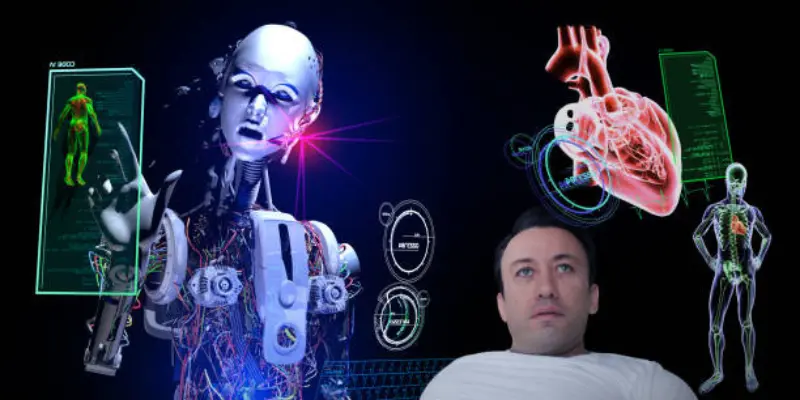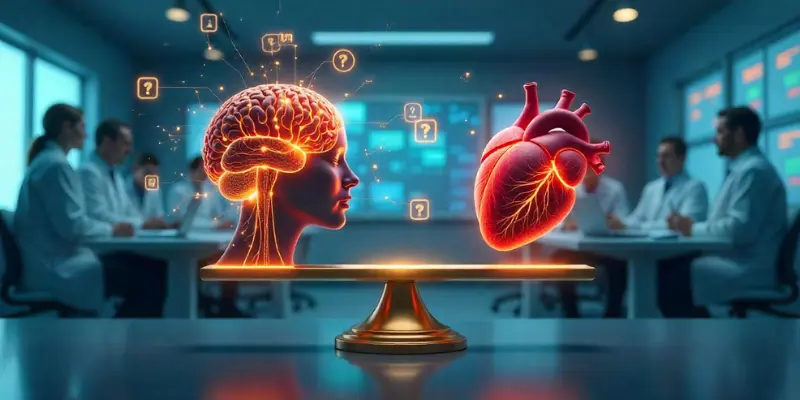How AI Is Changing Clinical Practice: A Simple Guide for Beginners
Published: 10 Apr 2025
Have you ever wondered how doctors make faster and better decisions today? A big reason is Artificial Intelligence which we call AI. It’s not just in robots or science fiction movies anymore. It’s now helping real doctors in real hospitals.
AI in clinical practice means using smart computer programs to support doctors and nurses. These tools can help with checking medical scans, finding diseases early or even reminding staff when a patient needs urgent care. Why is this important? Because AI helps doctors save time, reduce mistakes and better care for patients. It’s like having a smart assistant that never gets tired.

Let’s take a closer look at how this works in everyday healthcare. You’ll see how AI is slowly becoming a helpful part of clinical life—and why it matters to all of us.
What Does AI in Clinical Practice Mean?
Let’s keep it simple.
AI, or Artificial Intelligence, means machines that can think and learn like humans. In healthcare, it helps with tasks that usually take a lot of time like reading test results, checking symptoms or spotting health problems.
Now, what do we mean by clinical practice? That just means the daily work doctors, nurses and medical staff do to treat and care for patients. It includes checking symptoms, giving treatments, and making decisions to keep people healthy.
So, when we say AI in clinical practice, we’re talking about using smart tools to support this daily work. These tools don’t replace doctors. Instead, they work alongside them to make everything smoother, faster and more accurate.
📌 Real-Life Example
Imagine a doctor looking at a chest X-ray. AI can scan the image and quickly point out anything unusual which can be signs of simple pneumonia or chronic cancer. The doctor still makes the final decision but AI gives a helpful second opinion in seconds.
Where AI Is Used in Clinical Settings
AI is already helping in many areas of clinical work. Let’s look at a few simple and important ways it supports doctors, nurses and patients every day.
1. Diagnosis Support
Doctors often use scans like X-rays, MRIs or lab tests to find out what’s wrong. AI can read these results very quickly and spot things that are easy to miss.
Example: A radiologist looks at a lung X-ray. AI highlights a small dark spot that could be lung cancer. The doctor sees it faster and starts treatment sooner.
2. Treatment Planning
Every patient is different and thus the same treatment can not be planned. AI helps doctors in choosing the better treatments by studying many cases at once. It looks at the patient’s history, test results and even research papers.
Example: A cancer doctor uses an AI tool to compare hundreds of treatment options. The AI shows what worked best for patients with similar conditions. This helps the doctor plan smarter care.
3. Patient Monitoring
Some patients need to be watched closely. AI tools can track their heart rate, oxygen level or other vital signs. If something looks wrong, the system alerts staff right away which prevents emergency situations.
Example: A patient wears a smartwatch in the hospital. It checks the heartbeat 24/7. If the heart skips a beat or goes too fast, the AI sends a warning to the nurse.
4. Workflow and Admin Tasks
Doctors and nurses do a lot of paperwork. AI can help here too. It can schedule appointments, answer patient questions or organize health records.
Example: A hospital chatbot helps the patients to book visits or check test results. This saves time for the front desk and makes things easier for patients.
AI is not only working behind the scenes, it’s becoming a helpful hand in every corner of clinical care.
Benefits of AI in Clinical Practice
AI is making clinical work better in many ways. Here are some of the biggest benefits.

✅ Faster Diagnosis
We as humans can’t become much faster than our capabilities but AI can scan thousands of test results in seconds. This helps the doctors to find problems sooner, which means patients get treated faster.
🧠 Example: AI finds signs of a stroke on a brain scan right away and this way doctors can start emergency care without delay.
✅ Fewer Mistakes
I face many ups and downs in life and if I am asked to check the results on a day which has already gone bad then it is a greater possibility that I will make mistakes. AI doesn’t get tired or distracted. It can double-check results and reduce errors in diagnosis or treatment.
Example: An AI tool catches a small tumor a doctor might have missed on a busy day.
✅ Better Patient Care
Treatment and surgeries are not the end of headache for patients, continuous care is needed for most of the patients especially in chronic diseases. With AI handling some tasks, doctors can focus more on patients. That means more time for listening and better decisions.
Example: Instead of spending hours on paperwork, a doctor uses that time to talk with patients and explain care plans.
✅ Personalized Treatment
Every patient has unique genetics and the treatment must be planned accordingly. AI looks at a patient’s full history and recommends care that fits their specific needs. No more one-size-fits-all plans.
Example: A diabetic patient gets a custom care plan based on their age, lifestyle and past test results.
✅ Saves Time and Costs
AI speeds up routine work like appointment scheduling, report writing or test reviews. Hospitals can work more efficiently and save money too.
Example: AI tools sort patient files and lab reports automatically which is very helpful in reducing admin time.
These benefits make AI a strong partner in clinical care which allows doctors to work smarter, not harder.
Challenges of Using AI in Clinical Practice
AI is a powerful trend in healthcare. But like any new tool, it comes with some problems. Let’s look at the common challenges hospitals and clinics face when using AI.

⚠️ 1. Data Privacy Concerns
AI systems need a lot of patient data to work well. That means storing medical records, test results and other personal info. Keeping that data safe is very important.
Example: If an AI tool gets hacked, someone could see private health information. Hospitals must use strong security to stop that.
⚠️ 2. High Costs of AI Tools
Buying and setting up AI tools can be expensive. It takes hardware expenses and also maintenance. Small clinics may not have the money for advanced AI systems.
Example: A big hospital installs an AI-powered imaging system. A small clinic nearby still uses older tools because they can’t afford it.
⚠️ 3. Not Always Accurate
AI tools are smart but they’re not perfect. Sometimes they give wrong answers or miss something important. That’s why doctors still need to double-check AI results.
Example: An AI system suggests a wrong diagnosis due to bias or incomplete data training. Luckily, the doctor catches the mistake and chooses the correct one.
⚠️ 4. Staff Need Training
Doctors and nurses need time to learn how to use AI. Some tools are very tricky and need much time for complete understanding. If they don’t understand the system, they may not trust it or may use it wrong.
Example: A nurse gets confused using a new AI tool for tracking patient vitals. The hospital then offers training to help the staff feel more confident.
⚠️ 5. Risk of Over-Reliance
Some people may think AI can make all the decisions. They want AI to do tests, scans, diagnosis and planned treatment. But that’s risky. AI should help not replace human judgment.
Example: AI can suggest a wrong treatment to a person based on it’s previous test results and the patient might be suffering with two or more diseases at the same time.
AI can do amazing things—but it’s not magic. To use it safely, hospitals need good tools, trained staff and strong rules to protect patients.
Simple Tips for Healthcare Workers Using AI
Using AI in clinical practice doesn’t have to be hard. Here are some easy tips to help doctors, nurses and staff feel more comfortable with it.
💡 A. Start Small
You don’t have to use everything at once. Begin with one tool—like AI for scheduling or patient monitoring. Get used to it and then move on to more.
💡 B. Ask for Training
If you are not sure how a tool works, ask for help. Most AI companies offer training sessions or guides. Learn how the tool works and how to use it safely.
💡 C. Don’t Rely on AI Alone
AI is smart but it’s not perfect. It doesn’t have emotions like humans which are very important in healthcare. Always double-check what it says. Use your knowledge and experience too.
💡 D. Stay Updated
AI tools get better over time. Keep up with new features or updates. That way, you always get the best help from the tool.
💡 E. Protect Patient Data
Always follow your hospital’s privacy rules. Follow strict rules regarding data safety. Make sure the AI tool you use keeps patient information safe.
💡 F. Work Together
Always use a collaborative edge of AI and doctors in every department. Talk to your team about how AI is working. Share what helps and what doesn’t. Good teamwork makes AI even more useful.
By following these simple steps, healthcare workers can use AI with more confidence and help patients even more.
Want to know more about AI in healthcare? Read Should AI Be Used in Healthcare.
Conclusion – The Future of AI in Clinical Practice
AI is already changing the way healthcare works and its potential is just starting to be realized. As we’ve seen, AI helps the doctors to make quicker decisions, reduces mistakes and allows healthcare workers to spend more time caring for patients. The future of AI in clinical practice is exciting.
Now is the time to explore how AI can enhance your own practice or health system. The more we learn and adapt to these tools, the better healthcare will become for everyone.
So, take the first step, dive into exploring AI in Clinical Practice and see how this powerful tool can make a difference in your work and in the lives of your patients!
Related Queries about AI in Clinical Practices
Here are frequently asked questions about using AI for Clinical Purposes;
No, AI systems act as decision support tools for healthcare professionals, not replacements. They provide suggestions and insights based on data but doctors and nurses still review these recommendations and make the final decisions based on their expertise and your specific situation.
Healthcare AI systems must comply with strict privacy regulations like HIPAA. Your data should be encrypted, anonymized when possible and protected by the same security measures as electronic health records with healthcare facilities required to obtain proper consent before using your information.
While AI systems require initial investment, they’re designed to reduce costs in the long run. They can help in preventing expensive complications through early detection, reduce unnecessary tests and streamline administrative tasks which potentially make healthcare more affordable and efficient.
Current AI diagnostic tools typically achieve higher accuracy rates as compared to experienced specialists in specific, well-defined tasks. They excel at pattern recognition in images and data analysis but may miss contextual factors that human doctors would notice, which is why the combination of AI and human expertise provides the best results.
You don’t need any technical knowledge to benefit from AI in healthcare settings. The systems are designed to work in the background with healthcare providers managing the technology while you receive the benefits of more accurate diagnoses, personalized treatment plans and improved care.
Your healthcare provider should inform you if AI tools are being used in your care, typically during consent processes. You can always ask your provider directly about what technologies they use to support their decisions and most will be happy to explain how these tools help them provide better care.
The goal of AI in healthcare is to handle routine and computational tasks, freeing healthcare professionals to spend more quality time with patients. By reducing paperwork and administrative burdens, AI can actually help restore the human connection in medicine rather than diminish it.
Yes, consumer AI health applications include smart watches that monitor vital signs, medication reminder apps and symptom checkers. These tools can help you track your health metrics, maintain treatment plans and identify potential concerns at the comfort of your home that should be discussed with your healthcare provider.
Healthcare AI systems are designed with multiple safeguards, including human oversight from trained medical professionals. Your doctor will review any AI-generated suggestions before making final decisions about your care and you maintain the same rights to second opinions and the standard of care as with traditional approaches.
AI adoption varies widely across healthcare facilities with larger research hospitals typically leading implementation. Many smaller practices and clinics are gradually incorporating basic AI tools for specific functions like scheduling or medical imaging analysis but complete integration throughout the healthcare system is still evolving.





